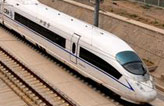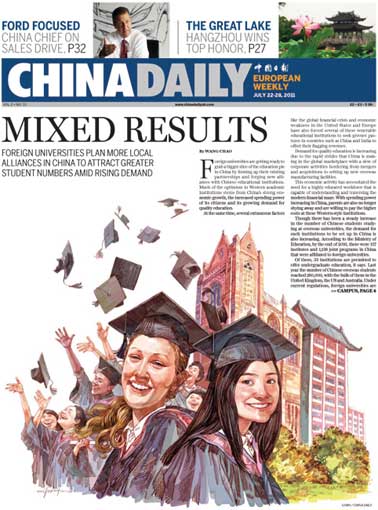Mixed Results
Updated: 2011-07-22 10:56
By Wang Chao (China Daily European Weekly)
Better option
For many wealthy parents worried about their only child going abroad, these schools are a much better option.
"My granddaughter is only a teenager, and barely speaks English. So how can she take care of herself alone in the UK? And what if she made bad friends?" was the concern expressed by the grandparents of Lu Mo when they were contemplating overseas education. After much debate among the family members, Lu was sent to the University of Nottingham Ningbo, the first "hybrid" university in China, in 2007.
After graduating this summer, Lu will pursue higher studies in the UK. "After four years in Nottingham Ningbo, I'm used to the Western teaching style. I have learned critical thinking, and my English has also improved. Now my family says I'm old and mature enough to study alone overseas, and then come back and run the family business of exporting Chinese furniture."
Liang Ji, among the first students enrolled in 2004, says she missed the school so much that she opened a cafe in the campus in 2010, two years after she graduated; but Liang says the business is "just for fun", since she then also had a job as a consultant in a foreign company.
"There were only 260 students in the campus back in 2004, so we are very close. I opened the cafe as a reunion place for classmates, as well as a club for concerts and movie screenings."
Liang recently decided to quit her job and pursue a master's degree back in Nottingham Ningbo. "My interest is in economic management. Since I'm familiar with the professors, I would like to work together with them to study some interesting topics."
The schools are also a much cheaper option than going abroad. The tuition fees at University of Nottingham are about 100,000 yuan (11,000 euros) per year; while living costs are another 100,000 yuan. In contrast, the total expenditure at Ningbo is around 80,000 yuan.
The hybrid schools also use slogans like, "receive the same education, stay close to your family, get the same diploma, and spend only one-fourth of what you spend in the UK campus!" to woo prospective students.
Some institutions also accommodate students in campus dormitories, not a common practice in the UK, to reassure protective parents.
Doubting Thomases
Many families are still hesitant to send their children to such institutions as they are still new and yet to earn academic credentials.
"For 50 years there have been only public universities in China and they have already gained trust from parents and students. Many parents feel that the 'hybrid' schools are non-mainstream choices. It takes time to build reputation and trust among parents and employers," says Shen Weiqi, registrar at University of Nottingham Ningbo.
High operating cost is another factor that affects most hybrid universities. According to the agreements with the local government, the university has to fend for itself by collecting fees from students for day-to-day operations and payment of salaries, Shen says. Most of the professors are paid salaries at UK levels. "All our expenses depend on the tuition fee we charge, about 60,000 yuan every year, 10 times more than a public school," he says.
Since its establishment as the first ever Sino-foreign university, Nottingham Ningbo has been under the spotlight in the education arena. Along with groups of visitors came the suspicion from the public: "How do you prove that you are worthy of the high tuition fees?"
This is also the vicious circle that most hybrid universities are trying to break, as students with good gaokao scores don't want to risk studying in such schools, forcing them to sometimes admit students with relatively poor academic scores, which exacerbates the stereotype.
E-paper

The perfect cut
Companies need to revamp, standardize to stave off quality challenges
Crowning achievement
Living happily ever after
Let there be smell
Specials

My China story
Foreign readers are invited to share your China stories.

90th anniversary of the CPC
The Party has been leading the country and people to prosperity.

Setting the pace in Turkey
China is building a 158-km high-speed railway in Turkey.
